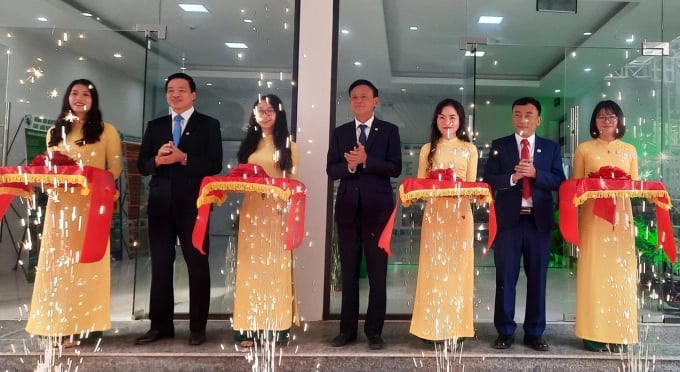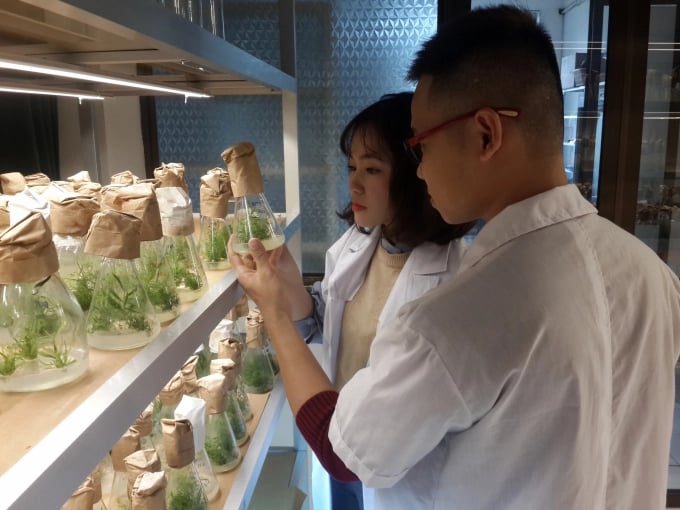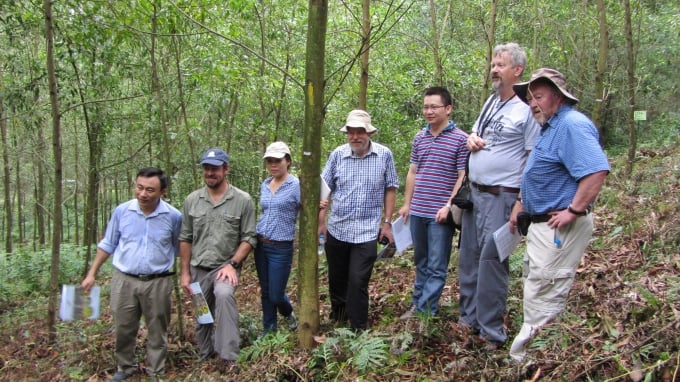November 27, 2025 | 20:30 GMT +7
November 27, 2025 | 20:30 GMT +7
Hotline: 0913.378.918
November 27, 2025 | 20:30 GMT +7
Hotline: 0913.378.918

Standing Deputy Minister of Agriculture and Rural Development Ha Cong Tuan awarded the Government's Emulation Flag to the Forest Tree Improvement and Biotechnology Research Institute on its 30th anniversary. Photo: Nguyen Huan.
For the last 30 years, the Forest Tree Improvement and Biotechnology Research Institute has studied and developed hundreds of forest tree species, of which 158 seeds, 27 breeding gardens and breeding forest were certified by the agriculture ministry.
Forest Tree Improvement and Biotechnology Research Institute was set up by former Minister Cao Đức Phát of Agriculture and Rural Development in 2012 based on Forest Tree Improvement Research Centre.
Speaking at its 30th anniversary on November 10, the institute's director Nguyen Duc Kien said that certified seeds were all high quality as they helped produce on average 20-40 cubic metres of timber per hectare per year.
The forest trees grew well, producing high-quality timber, well resistant to diseases, he said, emphasizing that high-quality seeds helped make a revolution in Vietnam’s forestry sector.

Standing Deputy Minister of Agriculture and Rural Development Ha Cong Tuan (centre) cut the ribbon to inaugurate the office of the Forest Tree Improvement and Biotechnology Research Institute. Photo: Nguyen Huan
The institute’s supply of seedlings and transfer seeding technologies to units across Vietnam helped improve productivity and quality of plantation forest in the country.
The yearly average amount of timber per hectare increased from 10 cu.m during the period 2000-2010 to 15-20 cu.m during the period 2015-2020, which helped increase the income of forest growers and develop relevant industries like making paper or the production of woodchips. Wooden stuff for export.
Kien said that the institute also kept improving its human resource as it was actively looking for and accessed co-operative international projects. It also joined training 15 doctors and 20 masters and human resources specialising in seeding, genetic conservation and forestry biotechnology. The institute published 60 journals on international publications and 235 writings in domestic science magazines.
The institute actively mastered advanced technologies and research studies to better its ability in developing new varieties which were high-yield, well resistant against diseases, produce quality timber and especially could adapt to climate changes, Kien said.
The institute also paid attention to conservation of genes of rare valuable trees. At the same time, it expanded regional and international co-operation to form a research network which helped boost information and experience sharing.

Seedlings are nursed in the lab of the Forest Tree Improvement and Biotechnology Research Institute. Photo: IFTIB.
Members of the network usually exchange seeding materials to diversify their seeds.
Since 2012, the Forest Tree Improvement and Biotechnology Research Institute was a founding member of the silvicultural and genetic research group of Acacia species of the International Union of Forestry Research Organisations.
Addressing the celebration marking the institute's 30th anniversary, Standing Deputy Minister of Agriculture and Rural Development Ha Cong Tuan applauded the institute’s achievements in the last 30 years.
He also appreciated the great supports and co-operations from the Australian Government, especially their contributions in the development of 158 seeds that the ministry certified.
Tuấn said that Vietnam determined to keep forest coverage at 42 per cent of its area and conserve the existing natural forest area as the country faced challenges due to climate change.
He said that researchers and experts at the Forest Tree Improvement and Biotechnology Research Institute would play an important role in studying and developing forest trees that produce economic benefits and improve the environment.
“In future, the institute must be a hub that supplies high-quality forest seeds and seedling and an example of applying biotechnologies in forestry,” Tuan said, calling for further improved human resource – a first step to realising such goals.

Experts from Australia visit a seed garden of the Forest Tree Improvement and Biotechnology Research Institute. Photo: IFTIB.
With great achievements, the Institute for Forest Breeding and Biotechnology was awarded the Second Class Labor Medal in 2001 by the Party and State, the National Prize for Science and Technology in 2000, and the Vietnam Golden Rice Awards in 2012 and 2018, the Government Emulation Flag in 2020.
Groups and individuals in the Institute have been given many awards and certificates of merit from the Government, the Ministry of Agriculture and Rural Development as well as from many international organisations.
Author: Nguyen Huan. Translated by Minh Van. Edited by Duc Huy.

(VAN) On November 27, in the meeting with Minister Tran Duc Thang, Mayor Yin Yong shared Beijing’s experience to improve environment and air quality.

(VAN) After 30 years, both sides identified strategic areas of cooperation: sustainable production, increasing coffee value and training for farmers.
/2025/11/27/4910-4-164708_294.jpg)
(VAN) On the afternoon of November 27 in Beijing, Minister of Agriculture and Environment Tran Duc Thang held a working session with several major Chinese enterprises operating in the agriculture and environment sector.

(VAN) The Department of Animal Health issued a provisional guideline requesting local authorities to increase surveillance, collect samples for testing, and conduct epidemiological investigations according to the established procedure.

(VAN) The United Nations recommends that Vietnam utilize data and artificial intelligence to enhance early disaster warnings and reduce GDP losses by 3.2% in the context of climate change.

(VAN) On the morning of November 27 in Beijing, Minister Tran Duc Thang and the Deputy Commissioner General of the General Administration of Customs of China signed a protocol on fresh jackfruit exports.

(VAN) As floodwaters recede, a vast network of irrigation works across eastern Gia Lai is emerging in a state of severe disrepair, with extensive damage demanding urgent restoration ahead of the 2025-2026 winter-spring cropping season.